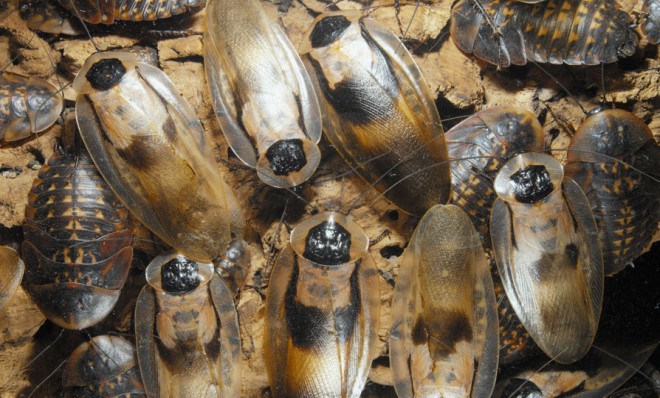5 fascinating reasons cockroaches will outlive us all
Virgin births, radiation-resistant DNA, plus the ability to survive decapitation for weeks on end? We don't stand a chance

Ah, cockroaches. The scummy, skittering, pesky little pests that somehow manage to vanish whenever you flick on the bathroom light. Like Mother Nature's little Batmans. Part of what makes them so hard to control is their resiliency, which is something of a biological marvel. Here are five reasons the humble roach will outlive us all:
1. They can adapt at a scary-fast rate
In the mid-1980s, exterminators began mixing sugary roach-bait with slow-acting poisons intended to spread and wipe out entire nests. It was an effective pest-control strategy, at least at the time. But by 1993 a strange thing happened: The toxins stopped working.
The Week
Escape your echo chamber. Get the facts behind the news, plus analysis from multiple perspectives.

Sign up for The Week's Free Newsletters
From our morning news briefing to a weekly Good News Newsletter, get the best of The Week delivered directly to your inbox.
From our morning news briefing to a weekly Good News Newsletter, get the best of The Week delivered directly to your inbox.
A new study from North Carolina State University may have the answer. New Scientist reports that, according to biologists, the cockroaches had "tweaked their internal chemistry so that glucose tastes bitter to them." Surviving bugs then "passed their aversions on to their descendants, and Darwinian selection made it more common."
In other words, the roaches had evolved in just a few generations.
2. Females don't need males to reproduce
Females can deliver 40 to 60 live offspring per birth. Need proof? Here's a really gross video:
A free daily email with the biggest news stories of the day – and the best features from TheWeek.com
But laying dozens of ghostly vermin isn't their only super-efficient reproductive trait. Females are capable of what scientists term parthenogenetic reproduction, or virgin births. According to the University of Massachusetts' biology department, "The American cockroach is said to be able to produce parthenogenetic offspring under severe conditions when no males are available." Girl roaches, in theory, could run the world.
3. They could probably survive a thermonuclear war
Imagine this: World War III winds to a close. The last nuclear cruise missile has long since exploded, and humans are slowly being erased from the planet, leaving Earth in the capable hands feet of the Cockroach World Order. You've probably heard some variation of this scenario before. And at least in theory, it's partly true.
Mythbusters tested the effects of radiation on cockroaches in an experiment. Of a population of thousands of roaches, the team discovered that 10 percent could survive Hiroshima-level radioactive rays after 30 days of exposure. According to Slate, it may be "because [roaches] are relatively simple organisms with fewer genes that might develop mutations." Their cells divide far more slowly than human cells, affording the roach's cellular chemistry more time to fix the problems caused by radiation, like broken strands of DNA. Small wonder their fossil records date back to 300 million B.C.
4. They can hold their breath for a long time
Ever wonder why pesticides are largely ineffective against large batches of roaches? It's partly because of their highly efficient breathing system. A 2009 Australian study found that cockroaches can hold their breath for five to seven minutes at a time. ABC Science reports that "oxygen flows in as required into the tracheal system through valves on the insect, called spiracles. But, sometimes, they shut their spiracles and stop breathing." Scientists think the mechanism helps regulate the insect's loss of water, especially during extended dry periods.
5. Yes, they can live without their heads
Here's a no-brainer: If you or I were to have our heads cut off, we'd die. We'd lose our ability to process the most basic bodily functions, like breathing. Plus, we'd quickly bleed to death.
Cockroach physiology is a totally different story. "They don't have a huge network of blood vessels like that of humans, or tiny capillaries that you need a lot of pressure to flow blood through," Joseph Kunkel, a biochemist at the University of Massachusetts Amherst, tells Scientific American. "They have an open circulatory system, which there's much less pressure in." If a roach were decapitated, it would simply continue to breathe through its spiracles, and its neck would seal off and clot so there's no uncontrolled bleeding.
Sure, the cockroach's aimless torso would lose a huge amount of sensory information provided by its antennae and brain, and it wouldn't be able to eat anything. That said, a newly decapitated roach who just had dinner can continue surviving for weeks on end. "As long as some predator doesn't eat them, they'll just stay quiet and sit around," says Kunkel.
-
 7 bars with comforting cocktails and great hospitality
7 bars with comforting cocktails and great hospitalitythe week recommends Winter is a fine time for going out and drinking up
-
 7 recipes that meet you wherever you are during winter
7 recipes that meet you wherever you are during winterthe week recommends Low-key January and decadent holiday eating are all accounted for
-
 Nine best TV shows of the year
Nine best TV shows of the yearThe Week Recommends From Adolescence to Amandaland